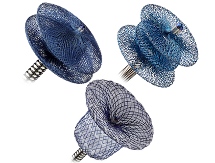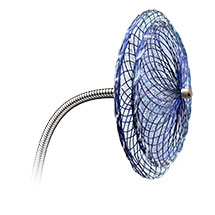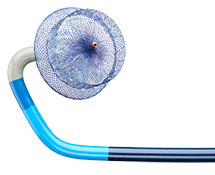The Amplatzer™ portfolio of structural intervention occluders provides minimally invasive treatment options for the closure of congenital heart defects and for stroke risk reduction. The closure procedures are performed through a transcatheter approach, which prevents the need for open heart surgery and enables faster recovery times.
The Amplatzer Family of Duct Occluders offers an extensive line of devices and a simple treatment option for the closure of patent ductus arteriosus (PDA). Amplatzer™ Duct Occluders are designed to occlude PDAs of various shapes and sizes. With an easy-to-perform deployment procedure, the implanting physician can be confident in placing the device with precision.

Amplatzer™ Septal Occluders are the standard of care for minimally invasive atrial septal defect (ASD) closure.1,2 These double-disc occluders are comprised of nitinol mesh and polyester material. They are designed to securely appose the septal wall on each side of the defect and create a platform for tissue in-growth after implantation.
Ventricular septal defects (VSD) are the most commonly found congenital heart defect.3 One subtype of these defects is muscular VSD. If left untreated it can lead to pulmonary hypertension and/or congestive heart failure.4 The Amplatzer™ Muscular VSD Occluders are designed for complete closure of these type of defects.
The Amplatzer™ Talisman™ PFO Occluder set the standard as the pioneering device developed specifically for patent foramen ovale (PFO) closure to reduce the risk of recurrent ischemic stroke.
With over 250,000 devices implanted and a legacy spanning over 25 years, it is the #1 device worldwide.4

The Amplatzer™ Amulet™ Left Atrial Appendage Occluder is designed to treat patients with non-valvular atrial fibrillation (AFib) who are at risk of ischemic stroke.
Its dual seal technology offers complete closure of the left atrial appendage and immediately eliminates the need for oral anticoagulants.6

MAT-2008014 v4.0 | Item approved for U.S. use only.
Rx Only
Important Safety Information
AMPLATZER™ DUCT OCCLUDER
Indications for Use
The Amplatzer™ Duct Occluder is a percutaneous, transcatheter occlusion device intended for the nonsurgical closure of a patent ductus arteriosus (PDA).
Contraindications
Patients weighing less than 6 kg; Patients less than 6 months of age; Presence of thrombus at the intended site of implant, or documented evidence of venous thrombus in the vessels through which access to the defect is gained; Active endocarditis or other infections producing bacteremia; Patients whose vasculature, through which access to the defect is gained, is inadequate to accommodate the appropriate sheath size; Patients with pulmonary hypertension with pulmonary vascular resistance of greater than 8 Wood units or Rp/Rs of greater than 0.4.
Potential Adverse Events
Placement of the AmplatzerTM Duct Occluder involves using standard interventional cardiac catheterization techniques. The following events might occur from either the catheterization procedure or from the device: Air embolus; Allergic drug reaction; Allergic dye reaction; Anesthesia reactions; Apnea; Arrhythmia; Bacterial endocarditis; Bleeding; Brachial plexus injury; Chest pain; Death; Delivery system failure; Fever; Headache/migraine; Hypertension/hypotension; Myocardial infarction; Partial obstruction of aorta; Partial obstruction of pulmonary artery; Perforation of vessel or myocardium; Peripheral embolism; Stroke/transient ischemic attack; Thrombus; Valvular regurgitation; Vascular access site complications.
Rx Only
Important Safety Information
Indication for Use
The Amplatzer™ Muscular VSD Occluder is indicated for use in patients with a complex ventricular septal defect (VSD) of significant size to warrant closure (large volume left-to-right shunt, pulmonary hypertension, and/or clinical symptoms of congestive heart failure) who are considered to be at high risk for standard transatrial or transarterial surgical closure based on anatomical conditions and/or based on overall medical condition.
High-risk anatomical factors for transatrial or transarterial surgical closure include patients: Requiring left ventriculotomy or an extensive right ventriculotomy; With a failed previous VSD closure; With multiple apical and/or anterior muscular VSDs (“Swiss cheese septum”); With posterior apical VSDs covered by trabeculae.
Contraindications
The Amplatzer™ Muscular VSD Occluder is contraindicated for the following: Patients with defects less than 4 mm distance from the semilunar (aortic and pulmonary) and atrioventricular valves (mitral and tricuspid); Patients with severely increased pulmonary vascular resistance above 7 Wood units and a right-to-left shunt and documented irreversible pulmonary vascular disease; Patients with perimembranous (close to the aortic valve) VSD; Patients with post-infarction VSD; Patients who weigh less than 5.2 kg. (Patients smaller than 5.2 kg were studied in the clinical trial, but due to poor outcome, these patients have been contraindicated for device placement. Data from these patients has not been included in the overall analysis); Patients with sepsis (local/generalized); Patients with active bacterial infections; Patients with contraindications to antiplatelet therapy or agents.
Potential Adverse Events
Potential adverse events that may occur during or after a procedure placing this device may include, but are not limited to: Air embolus; Allergic drug reaction; Allergic dye reaction; Anemia; Anesthesia reactions; Apnea; Arrhythmia; Arterial pulse loss; Atelectasis; Bacterial endocarditis; Blood loss requiring transfusion; Brachial plexus injury; Cardiac arrest; Cardiomyopathy; Chest pain; Cyanosis; Death; Device embolization; Device fracture; Fever; Headache/migraine; Heart block; Hypotension; Myocardial infarction; Perforation of the vessel or myocardium; Peripheral embolism; Stridor; Stroke; Subaortic stenosis; Thrombus formation on device; Vascular access site injury; Venous thrombosis; Vomiting.
Rx Only
Important Safety Information
AMPLATZER™ SEPTAL OCCLUDER AND DELIVERY SYSTEM
Indication for Use
The Amplatzer™ Septal Occluder is a percutaneous, transcatheter, atrial septal defect closure device intended for the occlusion of atrial septal defects (ASD) in secundum position or patients who have undergone a fenestrated Fontan procedure and who now require closure of the fenestration. Patients indicated for ASD closure have echocardiographic evidence of ostium secundum atrial septal defect and clinical evidence of right ventricular volume overload (such as, 1.5:1 degree of left-to-right shunt or RV enlargement).
Contraindications
The Amplatzer™ Septal Occluder is contraindicated for the following: Any patient known to have extensive congenital cardiac anomaly which can only be adequately repaired by way of cardiac surgery; Any patient known to have sepsis within 1 month prior to implantation, or any systemic infection that cannot be successfully treated prior to device placement; Any patient known to have a bleeding disorder, untreated ulcer, or any other contraindications to aspirin therapy, unless another antiplatelet agent can be administered for 6 months; Any patient known to have a demonstrated intracardiac thrombi on echocardiography (especially left atrial or left atrial appendage thrombi); Any patient whose size (such as, too small for transesophageal echocardiography probe, catheter size) or condition (active infection, etc.) would cause the patient to be a poor candidate for cardiac catheterization; Any patient where the margins of the defect are less than 5 mm to the coronary sinus, inferior vena cava rim, AV valves, or right upper lobe pulmonary vein.
Potential Adverse Events
Potential adverse events may occur during or after a procedure placing this device may include, but are not limited to: Air embolus; Allergic dye reaction; Anesthesia reactions; Apnea; Arrhythmia; Cardiac tamponade; Death; Embolization; Fever Hypertension/hypotension; Infection including endocarditis; Need for surgery; Pericardial effusion; Perforation of vessel or myocardium; Pseudoaneurysm including blood loss requiring transfusion; Stroke; Tissue erosion; Thrombus formation on discs; Valvular regurgitation.
Rx Only
Important Safety Information
Amplatzer™ Talisman™ PFO Occluder
Indications for Use
The AmplatzerTM TalismanTM PFO Occluder is indicated for percutaneous transcatheter closure of a patent foramen ovale (PFO) to reduce the risk of recurrent ischemic stroke in patients, predominantly between the ages of 18 and 60 years, who have had a stroke due to a presumed paradoxical embolism, as determined by a neurologist and cardiologist following an evaluation to exclude other causes of ischemic stroke.
Contraindications
Presence of thrombus at the intended site of implant, or documented evidence of venous thrombus in the vessels through which access to the defect is gained; Patients with intra-cardiac thrombus, mass, vegetation, or tumor; Patients whose vasculature, through which access to the PFO is gained, is inadequate to accommodate the appropriate sheath size; Patients with anatomy in which the required AmplatzerTM TalismanTM PFO device size would interfere with other intracardiac or intravascular structures, such as valves or pulmonary veins; Patients with another source of right-to-left shunts, including an atrial septal defect and/or fenestrated septum; Patients with active endocarditis or other untreated infections; Patients who are unable to tolerate intra-procedural anticoagulation or post-procedural anti-platelet therapy.
Potential Adverse Events
Potential adverse events that may occur during or after a procedure using this device may include, but are not limited to: Air embolus; Allergic reaction/toxic effect due to: anesthesia, contrast media, medication, or metal; Arrhythmia; Arteriovenous fistulae; Bleeding; Cardiac perforation; Cardiac tamponade; Chest pain; Death; Deep vein thrombosis; Device embolization; Device erosion; Endocarditis; Esophagus injury; Fever; Headache/migraine; Hematoma; Hypertension/hypotension; Infection; Myocardial infarction; Pacemaker placement secondary to PFO device closure; Pain; Pericardial effusion; Pericarditis; Peripheral embolism; Pseudoaneurysm; Pulmonary embolism; Reintervention for residual shunt/device removal; Stroke; Transient ischemic attack; Thrombus formation; Valvular regurgitation; Vascular access site injury; Vessel perforation.
Rx Only
Important Safety Information
The Amplatzer™ Amulet™ Left Atrial Appendage Occluder is a percutaneous transcatheter device intended to reduce the risk of thrombus embolization from the left atrial appendage (LAA) in patients who have nonvalvular atrial fibrillation and who are at increased risk for stroke and systemic embolism based on CHADS2 or CHA2DS2- VASc scores, are suitable for short term anticoagulation therapy, and have appropriate rationale to seek a non- pharmacologic alternative to oral anticoagulation, taking into consideration the safety and effectiveness of the device.
The Amplatzer™ Amulet™ Left Atrial Appendage (LAA) Occluder is contraindicated for patients:
Potential adverse events associated with the device or implant procedure include, but are not limited to, the following: Air embolism; Airway trauma; Allergic reaction; Anemia; Anesthesia reaction (nausea, vasovagal reaction, confusion/altered mental status or other); Arrhythmia; Atrial septal defect; Bleeding; Cardiac arrest; Cardiac tamponade; Chest pain/discomfort; Congestive heart failure; Death; Device embolization; Device erosion; Device malfunction; Device malposition; Device migration; Device-related thrombus; Fever; Hematuria; Hypertension/hypotension; Infection; Multi-organ failure; Myocardial infarction; Perforation; Pericardial effusion; Pleural effusion; Renal failure/dysfunction; Respiratory failure; Seizure; Significant residual flow; Stroke; Thrombocytopenia; Thromboembolism: peripheral and pulmonary; Thrombus formation; Transient ischemic attack; Valvular regurgitation/insufficiency; Vascular access site injury (hematoma, pseudoaneurysm, arteriovenous fistula, groin pain or other); Vessel trauma/injury.
Rx Only
Important Safety Information
Amulet™ Steerable Delivery Sheath
Indication for Use
The Amulet™ Steerable Delivery Sheath is indicated to facilitate the delivery of the Amplatzer™ Amulet™ Left Atrial Appendage Occluder.
Contraindications
The Amulet™ Steerable Delivery Sheath is contraindicated for patients:
The Amulet™ Steerable Delivery Sheath is contraindicated for use with a power injection system.
Potential Adverse Events
Potential adverse events that can occur during or after a procedure using this sheath may include but are not limited to: Air embolism, Allergic reaction/toxic effects (due to anesthesia, contrast media, etc.); Arrhythmia; Arteriovenous fistulae; Bleeding; Cardiac tamponade; Cardiac perforation; Death; Dissection; Embolism; Foreign material embolus; Heart failure; Hematoma; Hypotension/hypertension; Infection; Myocardial infarction/ischemia; Pericardial effusion; Peripheral embolism; Pseudoaneurysm; Stroke; Thrombosis; Transient ischemic attack; Vascular access site injury (such as arteriovenous fistulae, hematoma, pseudoaneurysm), Vessel trauma/damage.
Stay Connected